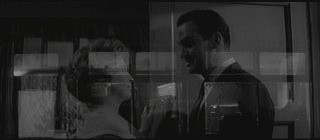The Happy Ending
This weekend I got around to watching Hell is a City (1960, Val Guest), a British crime drama I'd been keen on seeing after reading Andrew Spicer's essays. The film features Stanley Baker as an unhappily married police officer, Harry Martineau, whose professional travails against an escaped convict serve as counterpart for his marital challenges (in short, a frigid, petit bourgeois wife who doesn't want children). Toward the end of the film, there's a remarkable dissolve that pushes the half-spoken, half-unspeakable extramarital romance into the nebulous visibilty of the cinematic ellipsis. In a two shot, the other woman, Lucky, has just offered herself to Martineau, urging him to come by after his shift.
The two explanations aren't mutually exclusive but perhaps even as casual observers we have reason to believe the latter was operative. The DVD release, fortuitously, includes an alternate ending, this time which veers away from the cynicism of the original toward the "happy" ending. To take the final (at least in British cinemas) ending, Martineau walks into the city by himself as his fellow officers remark:
The alternate ending is similar to the original, only with a reconciliation with Martineau's wife Julia. He bursts into her bedroom in a fit of anger, then Julia decides suddenly to try for children. Val Guest, in the voiceover commentary, denies having directed this scene, and the visuals bear him out. Not only is the camerawork sloppy (the camera's shadow moves along the bed), but the cinematographic choices are pedestrian, in contrast to the deliberate and composed cinematography of the feature.
What the alternate ending suggests is that the film's producers were unsure about the commercial viability of the project, with its cynical thematics and violation of sexual mores. The happy ending – or in this case lack thereof – bespeaks the risk-adverse interests of the producer's impulse over the formula-adverse interests of the creative talent. Without a close production history, we won't know for sure, but it's an explanation that makes sense of the contradictions registered in the text itself.
I do think there's something to the Sirkian system argument – that there's some conscious exploitation of textual contradictions initiated by Sirk as directorial agent – but I wonder if Category E textual contradictions were increasingly engendered by the divergent pull of aesthetic expectations on the Classical cinematic text in its Rococo phase. (Or, as Tag Gallagher suggests, these contradictory forces were in place by the late1930s even.) In other words, what Sirk as auteur put in motion was simply an exaggerated expression of an industrial practice bound to happen anyway.
C.f. Paul Willemen, "The Sirkian System"; Tag Gallageher, "Shoot-Out at the Genre Corral"



The two explanations aren't mutually exclusive but perhaps even as casual observers we have reason to believe the latter was operative. The DVD release, fortuitously, includes an alternate ending, this time which veers away from the cynicism of the original toward the "happy" ending. To take the final (at least in British cinemas) ending, Martineau walks into the city by himself as his fellow officers remark:
- There goes a lonely man.Like the American noirs it was modeled on, then, the final ending balances a fallen woman's unrequited love for the protagonist with the existential solitude of the protagonist himself.
- I thought he was married.
- He is. But you don't have to be by yourself to be alone.
The alternate ending is similar to the original, only with a reconciliation with Martineau's wife Julia. He bursts into her bedroom in a fit of anger, then Julia decides suddenly to try for children. Val Guest, in the voiceover commentary, denies having directed this scene, and the visuals bear him out. Not only is the camerawork sloppy (the camera's shadow moves along the bed), but the cinematographic choices are pedestrian, in contrast to the deliberate and composed cinematography of the feature.
What the alternate ending suggests is that the film's producers were unsure about the commercial viability of the project, with its cynical thematics and violation of sexual mores. The happy ending – or in this case lack thereof – bespeaks the risk-adverse interests of the producer's impulse over the formula-adverse interests of the creative talent. Without a close production history, we won't know for sure, but it's an explanation that makes sense of the contradictions registered in the text itself.
I do think there's something to the Sirkian system argument – that there's some conscious exploitation of textual contradictions initiated by Sirk as directorial agent – but I wonder if Category E textual contradictions were increasingly engendered by the divergent pull of aesthetic expectations on the Classical cinematic text in its Rococo phase. (Or, as Tag Gallagher suggests, these contradictory forces were in place by the late1930s even.) In other words, what Sirk as auteur put in motion was simply an exaggerated expression of an industrial practice bound to happen anyway.
C.f. Paul Willemen, "The Sirkian System"; Tag Gallageher, "Shoot-Out at the Genre Corral"
Comments